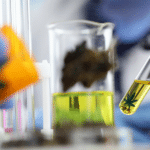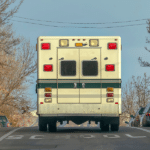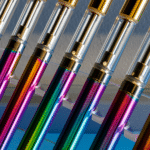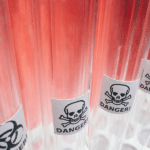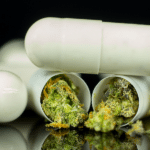In my search for really good broad- or full-spectrum CBD, I’ve found a few CBD gel cap brands that may have a little more THC than the federally allowed 0.3 percent limit for hemp-derived products. I say that because I’ve gotten a little high while using a few CBD brands.
I grew up in the ‘60s and used cannabis off and on from about 1967 to 1979, so when I briefly got a little high last year after taking four CBD caps I figured it was because the caps had a small amount of THC along with the CBD, and I’d taken more than the recommended dose. Lots of CBD brands suggest that users take one capsule, once or twice a day. But I routinely take more than recommended of everything — Advil, Zyrtec, Imodium, whatever. So, too with CBD.
I didn’t even consider that I’d get high on CBD. It’s well known as the non-intoxicating cannabinoid in cannabis and, as I tend to do, I’d been taking a lot of CBD for five years without getting high. The first time I got high by mistake, I was using a couple of new (to me) brands. I’d taken four gel caps, in total maybe 80 mg of CBD and what I presumed must have been a small amount of THC. But I had no way of knowing exactly how much THC, or anything else, might be in these unregulated CBD products.
Even in this brief period of mild intoxication, I appreciated the lightness of being one can get from a small amount of THC. But afterward one of my first thoughts was for unsuspecting CBD users, elders, and others who’d never been high and who’d heard that no one could get high on CBD alone. I worried that the experience of getting even a little high for a brief time might make some people uncomfortable. They might not understand what was happening, and that could permanently put them off using CBD, to their great misfortune.
Microdosing THC
I’ve lived in Virginia since 1983. It’s not a legal cannabis state, and until recently its medical cannabis program was stingy with approvals. Getting high around here isn’t common or legal, but CBD is readily available, at least in northern Virginia and online.
The more I learned about and experienced CBD, the more I appreciated the therapeutic value of THC — even small, sub-psychoactive amounts of THC, called microdosing. A 2017 report in Nature Medicine by Bilkei-Gorzo and colleagues showed that very low doses of THC in older mice restored learning and memory and social recognition abilities to levels seen in healthy young mice.
The THC microdosing treatment also enhanced molecular processes involved in cell plasticity, synapse formation, and cell signaling. And it positively affected genes involved in extending lifespan and improving cognition and a gene thought to be protective against Alzheimer’s. Some improvements lasted several weeks after treatment.
“Cannabis preparations and THC … have an excellent safety record and do not produce adverse side effects when administered at a low dose to older individuals,” Bilkei-Gorzo and colleagues wrote, adding that “chronic low-dose treatment with THC or cannabis extracts could be a potential strategy to slow down or even to reverse cognitive decline in the elderly.”1
Also in 2017, a paper by Yusef Sarne and colleagues in Neurobiology of Aging described a study designed to test whether an ultra-low THC dose would reverse age-dependent cognitive impairments in old mice. The researchers reported positive findings, “suggest[ing] that extremely low doses of THC that are devoid of any psychotropic effect … may provide a safe and effective treatment for cognitive decline in aging humans.”2
These studies were of special interest to me because my mother died of Alzheimer’s. If microdosing THC could slow or stop the degenerative process that leads to the disease in people, I was determined to microdose THC. And it’s good to know that, even in my non-legal state and without a medical cannabis program card, anyone who wanted or needed to could use CBD-rich essential oil extracts with a small amount of THC possibly to prevent future cognitive problems and neurodegenerative conditions.
CBD & THC: Better Together
There are lots of reasons to use THC and CBD as daily supplements. They work better together, and better still with other cannabinoids and terpenes, the so-called entourage effect. As an Israeli team of scientists noted in 1999: “This type of synergism may play a role in the widely held (but not experimentally based) view that in some cases plants are better drugs than the natural products isolated from them.”3
A decade later, Sean McAllister and colleagues at the California Pacific Medical Center Research Institute in San Francisco explored the synergistic effects of THC and CBD on human brain cancer and breast cancer cell lines.4
After screening a variety of cannabinoids for their anticancer properties, McAllister’s group concluded that CBD was “the most active inhibitor of several different aggressive cancers.” But if you combine CBD with THC, “you actually enhance the anticancer effects of CBD,” McAllister stated in a YouTube lecture about his team’s findings.5
Further, McAllister explained, when CBD and THC were combined in culture dishes with aggressive brain cancer cells, there was “a synergistic improvement in the ability of THC not only to inhibit the growth of these aggressive brain cancer cells but to cause programmed cell death, which is very important because you want to kill these tumor cells” so they can’t grow back.
Brazilian scientist FA Pamplona and colleagues provided more support for the entourage concept in a 2018 meta-analysis of epilepsy patient outcomes that compared the effects of whole-plant CBD-rich cannabis extracts (which included a small amount of THC) and a purified CBD isolate. Both the isolate and the essential oil were remarkably effective for otherwise intractable seizure disorders, but the oil extracts proved superior: “CBD-rich extracts seem to present a better therapeutic profile than purified CBD, at least in this population of patients with refractory epilepsy,” the authors concluded.6
Benefits of Getting High
If you want to use CBD or even THC but you’re worried about getting high, here are some reassuring thoughts from Dr. Dustin Sulak, an integrative medicine practitioner who focuses on medical cannabis, osteopathy, and mind-body healing. Sulak founded Integr8 Health, a holistic health practice with locations in Maine and Massachusetts that treat more than 8,000 medical cannabis patients. His educational platform, healer.com, is full of helpful information for patients and physicians.
In 2019, Sulak spoke at CannMed, an annual conference that showcases new developments in cannabis science and therapeutics. In his talk, Sulak discussed the adverse effects and the benefits of getting high on cannabis.
For adverse reactions, Sulak mentioned memory deficits, confusion, anxiety, paranoia, impaired coordination, dizziness, and being tired: “These are things I see as side effects in my practice, typically related to excessive doses of THC and also to factors of set [mindset] and setting [environment],” both of which influence a person’s response to cannabis.
And what are the psychoactive benefits of cannabis?
“To begin with,” he said, “euphoria.”
Described dismissively in many research papers as an undesirable side effect, cannabis-induced euphoria is critically important to many patients who are suffering. It’s about “positive mood, relaxation, laughter, socializing, and time distortion that allows them to come into the present moment,” Sulak noted. “And then there’s the intensification of ordinary experiences that can be leveraged for a practice of mindfulness called savoring.”
Sulak called savoring an antidote to anhedonia, which is an inability to feel pleasure. This is “a major culprit in depression and especially opioid use disorder, when people are no longer able to experience pleasure from the natural things in their lives that should give them pleasure,” Sulak explained, so they seek something that temporarily gives them a stronger pleasure signal, and it becomes “a downward spiral” in which they have to use a drug or a substance just to feel normal.
Cannabis, especially THC, can break that cycle, he told the CannMed audience.
“When [cannabis is] used intentionally to support a process of savoring, people can restore the natural pleasure they get from healthy activities in their lives, including eating, listening to music, having sex, just connecting, taking a walk, smelling the flowers,” he asserted. Experiencing cannabis this way can help patients separate their pain from the good things, the pleasure, the people that matter in their lives.
“This unbundling,” Sulak said, “is an essential gift of cannabis.”
Cheryl Pellerin, a writer who specializes in science journalism, is the author of Healing With Cannabis: The Evolution of the Endocannabinoid System and How Cannabinoids Help Relieve PTSD, Pain, MS, Anxiety, and More (Skyhorse Publishing). Her first book, Trips: How Hallucinogens Work in Your Brain, with art by Robert Crumb, was translated into French and German.
Footnotes
- Bilkei-Gorzo A, O Albayram, A Draffehn, K Michel, A Piyanova, H Oppenheimer, M Dvir-Ginzberg, I Rácz, T Ulas, S Imbeault, I Bab, JL Schultze, A Zimmer. “A chronic low dose of Δ9-tetrahydrocannabinol (THC) restores cognitive function in old mice.” Nat Med 2017 June;23(6):782–787 (doi: 10.1038/nm.4311).
- Sarne Y. R Toledano, L Rachmany, E Sasson, R Doron. “Reversal of age-related cognitive impairments in mice by an extremely low dose of tetrahydrocannabinol.” Neurobiol Aging 2017 Sept;61:177–86 (doi: 10.1016/j.neurobiolaging.2017.09.025).
- Mechoulam R, S Ben-Shabat. (1999). From gan-zi-gun-nu to anandamide and 2-arachidonoylglycerol: the ongoing story of cannabis. Nat Prod Rep 16;131–143. (doi: 10.1039/a703973e).
- McAllister SD, Soroceanu L, Desprez PY. The Antitumor Activity of Plant-Derived Non-Psychoactive Cannabinoids. J Neuroimmune Pharmacol 2015;10(2):255-267 (doi:10.1007/s11481-015-9608-y).
- McAllister SD, YouTube, March 2015. https://www.youtube.com/watch?v=2p8annrQ9vM, accessed 07/03/2020.
- Pamplona FA, LR da Silva, AC Coan. “Potential clinical benefits of CBD-rich cannabis extracts over purified CBD in treatment-resistant epilepsy: Observational data meta-analysis.” Front Neurol 2018;9:759 (doi: 10.3389/fneur.2018.00759).
Recommended Readings
Is “Pure” CBD Better?
A groundbreaking study has documented the superior therapeutic properties of whole plant CBD extract.
THC vs. Breast Cancer
A comparison of the antitumoral activity of single-molecule THC and whole plant cannabis oil.





